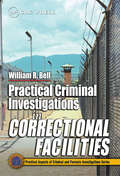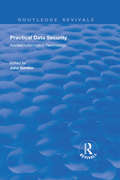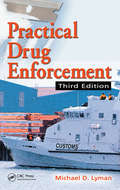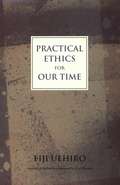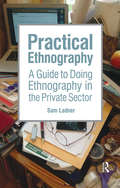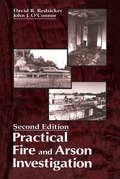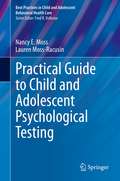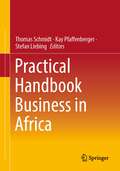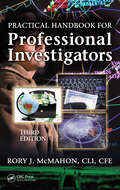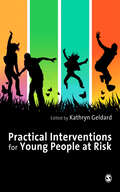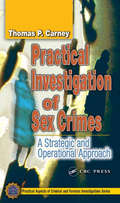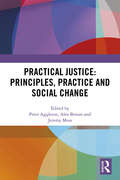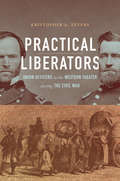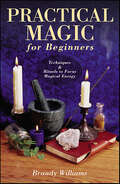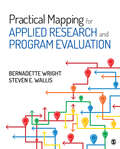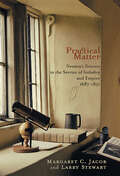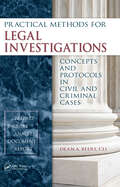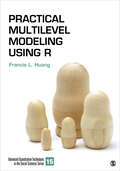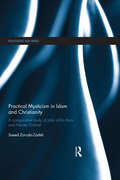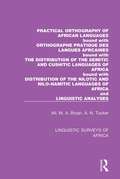- Table View
- List View
Practical Criminal Investigations in Correctional Facilities (ISSN)
by William R. BellAN INSIDE LOOK INTO INVESTIGATING THE MOST VIOLENT SUB-CULTURE IN THE WORLDOnce an offender is behind bars, many people believe that he is no longer a threat to society. However, the felonious activities of confined inmates reach out into society every day. These inmates run lucrative drug operations, commit fraud, hire contract murders, an
Practical Data Security (Routledge Revivals)
by John GordonFirst published in 1993, this volume emerged in response to the genesis of the Internet and provides early considerations on issues including computer viruses, cyber security and network encryption management, with a particular focus on applying risk analysis to the data security of financial institutions. With the stage set by the UK Data Protection Act of 1984 and the Computer Misuse Act of 1990, this volume provides a series of useful contributions for large companies and home PCs and provides a clear introduction setting out the context and the relevant terminology.
Practical Drug Enforcement (ISSN)
by Michael D. LymanCriminal investigation is a dynamic endeavor impacted by changes in human nature, statutory and constitutional laws, and methods of operation. New challenges are constantly posed for the investigator and the investigation of drug offenses is no exception. It takes advanced skills to keep pace with the criminal mind. Unfortunately, the skills acquir
Practical Ethics for Our Time
by Carl Becker Eiji UehiroA scathing critique of the global consumer culture that's bound to cause controversy among Western readers, Practical Ethics for Our Time argues that Japan's future success as a nation depends upon the ability of its citizens to uphold traditional family values and to fashion new, environmentally sustainable patterns in their daily lives.Mr. Uehiro's argument is not unfamiliar. He posits that Japan's rapid industrialization and Westernization since the Meiji Restoration has created a nation of people with an insatiable appet ite for designer clothing, luxury cars, and high-tech gadgets but with a profound sense of spiritual emptiness. Uehiro suggests that as human be ings move farther and farther away from the process of producing goods themselves,they begin to take their abundance for granted, and thus lose a sense of thankfulness for what they have. This leads to a world in which human interactions become superficial and commodified, and ethics take a back seat to other, more quantifiable concerns. While Japan has gained tremendous international respect for its rapid industrialization since World War II , Uehiro believes that Japan has a greater role to play on the international stage as a model of proper ethical behavior- but only if it can reverse Western-influenced trends.
Practical Ethics for Our Time
by Carl Becker Eiji UehiroA scathing critique of the global consumer culture that's bound to cause controversy among Western readers, Practical Ethics for Our Time argues that Japan's future success as a nation depends upon the ability of its citizens to uphold traditional family values and to fashion new, environmentally sustainable patterns in their daily lives.Mr. Uehiro's argument is not unfamiliar. He posits that Japan's rapid industrialization and Westernization since the Meiji Restoration has created a nation of people with an insatiable appet ite for designer clothing, luxury cars, and high-tech gadgets but with a profound sense of spiritual emptiness. Uehiro suggests that as human be ings move farther and farther away from the process of producing goods themselves,they begin to take their abundance for granted, and thus lose a sense of thankfulness for what they have. This leads to a world in which human interactions become superficial and commodified, and ethics take a back seat to other, more quantifiable concerns. While Japan has gained tremendous international respect for its rapid industrialization since World War II , Uehiro believes that Japan has a greater role to play on the international stage as a model of proper ethical behavior- but only if it can reverse Western-influenced trends.
Practical Ethnography: A Guide to Doing Ethnography in the Private Sector
by Sam LadnerEthnography is an increasingly important research method in the private sector, yet ethnographic literature continues to focus on an academic audience. Sam Ladner fills the gap by advancing rigorous ethnographic practice that is tailored to corporate settings where colleagues are not steeped in social theory, research time lines may be days rather than months or years, and research sponsors expect actionable outcomes and recommendations. Ladner provides step-by-step guidance at every turn--covering core methods, research design, using the latest mobile and digital technologies, project and client management, ethics, reporting, and translating your findings into business strategies. This book is the perfect resource for private-sector researchers, designers, and managers seeking robust ethnographic tools or academic researchers hoping to conduct research in corporate settings. More information on the book is available at http://www.practicalethnography.com/.
Practical Fire and Arson Investigation (ISSN)
by David R. Redsicker John J. O'ConnorDid you know. . .. . . that arson has been described as the fastest-growing crime in America?. . . that arson is the most expensive crime committed?. . . that over 8 billion dollars was estimated lost due to fires in 1994?. . . that an estimated 86,000 structure fires of incendiary or suspicious origin were reported in 1994?Davi
Practical Guide to Child Protection: The Challenges, Pitfalls and Practical Solutions
by Joanna NicolasIdentifying the most serious challenges faced in child protection work, this practical guide offers helpful solutions for frontline professionals working with children and adults. Informed by her many years on the frontline and subsequent experience writing serious case reviews, Joanna Nicolas has identified the most common pitfalls in child protection cases. The book focuses on understanding the impact of neglect, information sharing between professionals, communication with children, working with non-compliance/disguised compliance, and the impact of multiple risk factors. It offers tips for overcoming the challenges of everyday practice, such as home visits, as well as enhancing understanding of the key issues in this complex field. The evidence-informed chapters are packed with case examples and include useful reminders of the underlying principles at play. This is essential reading for social workers, health care workers, mental health workers, education professionals and related professions, such as housing and probation.
Practical Guide to Child and Adolescent Psychological Testing (Best Practices in Child and Adolescent Behavioral Health Care)
by Nancy E. Moss Lauren Moss-RacusinThis book explains the psychological assessment process and reviews the origins of psychological testing, referral and testing processes, and prominent psychological assessment instruments. Most important, this book details how to evaluate testing data and use them to understand an individual’s needs and to inform interventions and treatments.This book addresses specific domains of psychological assessment, including:· Intelligence and academic achievement.· Speech-language and visual-motor abilities.· Memory, attention/concentration, and executive functioning.· Behavioral and social-emotional functioning.· Developmental status.Practical Guide to Child and Adolescent Psychological Testing is an essential resource for clinicians, primary care providers, and other practitioners as well as researchers, professors, and graduate students in the fields of child, school, and developmental psychology, pediatrics and social work, child and adolescent psychiatry, primary care medicine, and related disciplines.
Practical Handbook Business in Africa
by Thomas Schmidt Kay Pfaffenberger Stefan LiebingAfrica is a continent on the upswing, developing great economic momentum. If German companies want to participate in Africa's upswing, they need to be familiar with some special features. This book shows the way to successful business in Africa. It is a practical, yet scientifically based guide for all entrepreneurs and economically interested parties who want to be successful in Africa. It combines the experience of many companies with the scientific perspective and findings of the Centre for Business and Technology in Africa at Flensburg University of Applied Sciences.In the 2nd edition new developments on the African continent are taken up and current answers are given to the classical questions, which each actor must answer for itself, which wants to be economically successful in Africa: WHY Africa is interesting for the business, WHERE the largest chances of success exist, HOW to proceed and WHICH approaches for the future organization of the economic relations between Germany and Africa are promising.The book describes how to invest in Africa and bundles the current experiences of managers of large corporations and family businesses with a long history on the continent.
Practical Handbook for Professional Investigators
by Rory J. McMahon CLI CFE Randy DicksonThe third edition of this popular volume continues to supply an up-to-date, nuts-and-bolts learning tool for students and an everyday reference for investigative professionals at all levels. More relevant than ever, this edition adds two new chapters on death and terrorism investigations and several new sections, including insurance fraud, fire and arson investigation; indicators of online marital infidelity; obtaining governmental reports; service of subpoenas for witnesses in federal courts; the Rules of Professional Conduct; niche markets in the investigative industry; and managing and marketing an investigative practice.
Practical Handbook of Multi-Tiered Systems of Support
by Rachel Brown-Chidsey Rebekah BickfordAccessible and comprehensive, this book shows how to build a schoolwide multi-tiered system of support (MTSS) from the ground up. The MTSS framework encompasses tiered systems such as response to intervention (RTI) and positive behavioral interventions and supports (PBIS), and is designed to help all K-12 students succeed. Every component of an MTSS is discussed: effective instruction, the role of school teams, implementation in action, assessment, problem solving, and data-based decision making. Practitioner-friendly features include reflections from experienced implementers and an extended case study. Reproducible checklists and forms can be downloaded and printed in a convenient 8 1/2" x 11" size.
Practical Interventions for Young People at Risk
by Kathryn Geldard"The book's rich, relevant and comprehensive contributions from experienced writers make it a substantial resource for teaching, reference and research." Mark Prever, trainer, writer and supervisor "The needs and problems of young people are currently extremely topical and justify a dedicated textbook. The wide range of internationally renowned authors contributes to the strengths and diversity of this publication, enhancing its potential as a resource for students and professionals." Jenny Pinfield, University of Worcester This book responds to the urgent need for practical intervention approaches targeting young people at risk. It provides a much needed practical resource for practitioners and students from a variety of helping professions. Focussing on interventions that practitioners can use in collaboration with the young person, the book offers hands-on strategies for addressing challenges and issues typically face by young people, such as: - Depression, suicide and self-harm - Substance Misuse - Problematic Sexual Behaviour - Marginalised Youth - Mental Health Issues. Throughout the book, multi-disciplinary and international authors share their expertise, highlighting relevant evidence-based interventions and considering themes such as anti-oppressive practice, culture, values and ethics. It will prove invaluable reading for students and practitioners working with young people, especially in the fields of youth work, social work, psychology, counselling, and education.
Practical Investigation of Sex Crimes: A Strategic and Operational Approach (ISSN)
by Thomas P. CarneyBecause of the sensitive nature of sex crimes, police officials must develop a specialized set of interviewing skills to effectively investigate them. Written by former Commanding Officer of the Manhattan Special Victims Squad Thomas P. Carney, Practical Investigation of Sex Crimes: A Strategic and Operational Approach provides a day-to-day guide f
Practical Justice: Principles, Practice And Social Change
by Jeremy Moss Peter Aggleton Alex BroomThis volume engages with questions of justice and equality, and how these can be achieved in modern society. It explores how theory and research can inform policy and practice to bring about real change in people’s lives, helping readers understand and interrogate patterns and causes of inequality, while investigating how these might be remedied. Chapters outline ways in which theories of justice inform and are factored into effective actions, programmes and interventions. The book includes an international selection of case studies. These range from global inequalities in development and health to cross-border conflict; from gender justice to disability violence; from child protection to disability-inclusive research; from illicit drug use to torture prevention; and from prison wellbeing to sexual and reproductive health and rights. Together, contributors explore: how social science and humanities scholarship can lead to a better understanding of, and capacity to respond to, key social issues and problems the importance of normative reflection and a concern for principles of justice in pursuit of social change the importance of community voice and grassroots action in the pursuit of justice, equity and equality. Envisioning a better world – in which concern for the just treatment of all trumps the pursuit of privilege and inequality – Practical Justice: Principles, Practice and Social Change will appeal to students and academics in disciplines as diverse as philosophy, political science, sociology, anthropology, geography and education, and in fields such as policy studies, criminology, healthcare, social work and social welfare.
Practical Liberators: Union Officers in the Western Theater during the Civil War (Civil War America)
by Kristopher A. TetersDuring the first fifteen months of the Civil War, the policies and attitudes of Union officers toward emancipation in the western theater were, at best, inconsistent and fraught with internal strains. But after Congress passed the Second Confiscation Act in 1862, army policy became mostly consistent in its support of liberating the slaves in general, in spite of Union army officers' differences of opinion. By 1863 and the final Emancipation Proclamation, the army had transformed into the key force for instituting emancipation in the West. However, Kristopher Teters argues that the guiding principles behind this development in attitudes and policy were a result of military necessity and pragmatic strategies, rather than an effort to enact racial equality.Through extensive research in the letters and diaries of western Union officers, Teters demonstrates how practical considerations drove both the attitudes and policies of Union officers regarding emancipation. Officers primarily embraced emancipation and the use of black soldiers because they believed both policies would help them win the war and save the Union, but their views on race actually changed very little. In the end, however, despite its practical bent, Teters argues, the Union army was instrumental in bringing freedom to the slaves.
Practical Magic for Beginners: Techniques & Rituals to Focus Magical Energy (Llewellyn's For Beginners)
by Brandy WilliamsAnyone can practice magic to improve their everyday lives. Practical Magic for Beginners is a straightforward introduction to magical practice for Christians, Pagans, Jews, atheists, and people of all religious traditions.This comprehensive training course presents the foundations of spellcraft and ritual magic through short, simple exercises. Readers explore their energy and senses, and then move on to developing skills in extrasensory perception, divination, and introspection. Magical timing, magical processes, ritual space and tools, journaling, and dreamwork are explained and discussed in depth. This nondenominational guidebook also includes twenty rituals related to friendship, love, prosperity, health, and other common concerns.
Practical Mapping for Applied Research and Program Evaluation
by Bernadette M. Wright Steven E. WallisPractical Mapping for Applied Research and Program Evaluation is the first book to bring the mapping methodology to social research and program evaluation. Bernadette Wright and Steven E. Wallis guide readers through all phases of the research process: learning from stakeholder experience; reviewing existing knowledge in the field; conducting new data collection such as interviews; collaborating with other researchers; and facilitating the use of knowledge for communication, collaboration, and action. With plenty of illustrations and navigational aids such as "travel tips," the book is an accessible guide for busy students, researchers, and managers of all levels of experience.
Practical Mapping for Applied Research and Program Evaluation
by Bernadette M. Wright Steven E. WallisPractical Mapping for Applied Research and Program Evaluation is the first book to bring the mapping methodology to social research and program evaluation. Bernadette Wright and Steven E. Wallis guide readers through all phases of the research process: learning from stakeholder experience; reviewing existing knowledge in the field; conducting new data collection such as interviews; collaborating with other researchers; and facilitating the use of knowledge for communication, collaboration, and action. With plenty of illustrations and navigational aids such as "travel tips," the book is an accessible guide for busy students, researchers, and managers of all levels of experience.
Practical Matter: Newton's Science in the Service of Industry and Empire, 1687–1851 (New Histories of Science, Technology, and Medicine)
by Margaret C. Jacob Larry Stewart&“A highly ambitious and provocative survey of the cultural history of science and industry&” from the seventeenth to the nineteenth centuries (Journal of Modern History). In 1687, the publication of Isaac Newton&’s Principia Mathematica sparked a profound transformation in the world. From that event in the late-seventeenth century to the Crystal Palace Exhibition of 1851, science gradually moved to the center Western thought and economic development. In Practical Matter, Margaret Jacob and Larry Stewart chronicle this dramatic, epochal shift. Despite powerful opposition on the Continent, a Newtonian understanding gained broad-based acceptance and practical application. By the mid-eighteenth century, the race was on to apply Newtonian mechanics to industry and manufacturing. The ascendancy of the new science culminated in the creating of the Crystal Palace Exhibition, London&’s temple to scientific and technological progress. With fascinating insight into the changing culture of industry and higher learning, Jacob and Stewart show that there was nothing inevitable about the Scientific Revolution. &“It is easy to forget that science might have been stillborn, or remained the esoteric knowledge of court elites. Instead, for better and for worse, science became a centerpiece of Western culture.&”
Practical Methods for Legal Investigations: Concepts and Protocols in Civil and Criminal Cases
by CLI, Dean BeersLegal investigators are responsible for providing factual evidence � as the fact finders, they are the foundation for the attorneys they work with daily. The attorney is responsible for forming and implementing the legal strategy and presenting it to the judge or jury. The legal investigator provides checks and balances to ensure that no evidence i
Practical Multilevel Modeling Using R (Advanced Quantitative Techniques in the Social Sciences)
by Francis L. HuangPractical Multilevel Modeling Using R provides students with a step-by-step guide for running their own multilevel analyses. Detailed examples illustrate the conceptual and statistical issues that multilevel modeling addresses in a way that is clear and relevant to students in applied disciplines. Clearly annotated R syntax illustrates how multilevel modeling (MLM) can be used, and real-world examples show why and how modeling decisions can affect results. The book covers all the basics but also important advanced topics such as diagnostics, detecting and handling heteroscedasticity, power analysis, and missing data handling methods. Unlike other detailed texts on MLM which are written at a very high level, this text with its applied focus and use of R software to run the analyses is much more suitable for students who have substantive research areas but are not training to be methodologists or statisticians. Each chapter concludes with a "Test Yourself" section, and solutions are available on the instructor website for the book. A companion R package is available for use with this text.
Practical Multilevel Modeling Using R (Advanced Quantitative Techniques in the Social Sciences)
by Francis L. HuangPractical Multilevel Modeling Using R provides students with a step-by-step guide for running their own multilevel analyses. Detailed examples illustrate the conceptual and statistical issues that multilevel modeling addresses in a way that is clear and relevant to students in applied disciplines. Clearly annotated R syntax illustrates how multilevel modeling (MLM) can be used, and real-world examples show why and how modeling decisions can affect results. The book covers all the basics but also important advanced topics such as diagnostics, detecting and handling heteroscedasticity, power analysis, and missing data handling methods. Unlike other detailed texts on MLM which are written at a very high level, this text with its applied focus and use of R software to run the analyses is much more suitable for students who have substantive research areas but are not training to be methodologists or statisticians. Each chapter concludes with a "Test Yourself" section, and solutions are available on the instructor website for the book. A companion R package is available for use with this text.
Practical Mysticism in Islam and Christianity: A Comparative Study of Jalal al-Din Rumi and Meister Eckhart (Routledge Sufi Series)
by Saeed Zarrabi-ZadehPractical Mysticism in Islam and Christianity offers a comparative study of the works of the Sufi-poet Jalal al-Din Rumi (1207-1273) and the practical teachings of the German Dominican, Meister Eckhart (c1260-1327/8). Rumi has remained an influential figure in Islamic mystical discourse since the thirteenth century, while also extending his impact to the Western spiritual arena. However, his ideas have frequently been interpreted within the framework of other mystical, philosophical, or religious systems. Through its novel approach, this book aims to reformulate Rumi’s practical mysticism by employing four methodological principles: a) mysticism is a coherent structure with mutual interconnection between its parts; b) the imposition of alien structures to interpret any particular mysticism damages its inward coherency; c) practical mysticism consists of two main parts, namely practices and stages; and d) the proper use of comparative methodology enables a deeper understanding of each juxtaposed system. Eckhart’s speculative mysticism, which differs from and enjoys similarities with the love-based mysticism of Rumi, provides a "mirror" that highlights the special features of Rumi’s practical mysticism. Such comparison also allows a deeper comprehension of Eckhart’s practical thought. Offering a critical examination of practical mysticism, this book is a valuable resource for students and scholars of Islamic studies, comparative mysticism, and the intellectual history of Islam.
Practical Orthography of African Languages: Bound with: Orthographe Pratique des Langues Africaines; The Distribution of the Semitic and Cushitic Languages of Africa; The Distribution of the Nilotic and Nilo-Hamitic Languages of Africa; and Linguistic Analyses (Linguistic Surveys of Africa #12)
by International African InstituteThe first edition of the Practical Orthography of African Languages was a best-seller and this and the following volume re-issues the second edition, in English and French. Originally published in 1930, it provided an invaluable solution to the problem of finding a practical and uniform method of writing African languages. The volume is bound with a small pamphlet which analyses the information on the Semitic and cushitic languages of Eritrea, Ethiopia and the Anglo-Egyptian Sudan. Related languages are grouped together into larger sections which have some linguistic significance. A further pamphlet, the Distribution of the Nilotic and Nilo-Hamitic Languages of Africa, describes the relationship between languages and dialects. For each language, data are given on locality, number of speakers, use for educational and religious purposes and the extent of vernacular literature. The linguistic material is set out in phonetic script with tone marks, though reference is made to current standard orthoraphies where these exist.
